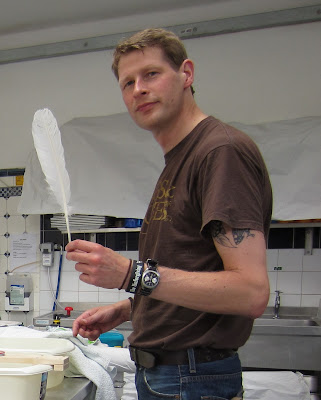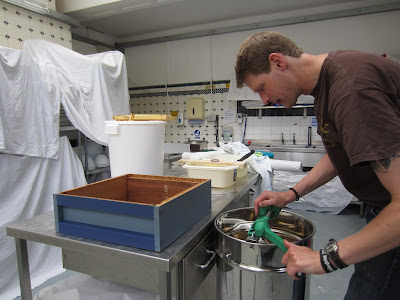In the morning I quickly (and luckily - as will be seen later) read up a bit more about what to expect and then donned old gardening clothes (in the expectation of being covered in honey and unwilling to sacrifice decent clothes for this) and packed my capping board, a towel, the plastic tubs, a bread knife and a feather. Yes - a feather. This in fact turned out to be the most important piece of equipment of the day.
 |
| The tool of the day |
A book had said if the super still has some bees in it, then you can remove the frames singly and brush the bees off with a feather; if you do this some distance from the hive, they will just fly back to their hive. Hence the feather.
The more perceptive among you already know what's coming.
The Moon super was of course not empty of bees, but still had a sizeable population crawling around in it. So, I threw the towel over the top (rather than in) and wrapped it around, ensuring it was tight so no more bees could get in (the chances of the ones already there leaving of their own accord was minimal), and brought it to the waiting car. I then removed the one-way doors (also known as porter bee escapes) from the crown board (the hive's roof), took out the queen excluder and left the Moon to itself.
Back to the super wrapped in a beach towel by the car.
This was some way from the hive and I thought (beesuit still on), that I would tickle the bees out of the super. I think as many flew back into the super as I flicked out. No question of them blithely flying back to their hive - they were in the super for good. Wrapping the present up again tightly, I put it in the boot and drove it to the school kitchen entrance. Here, having put the super on the floor, I attempted once again to coax the bees out of the super. Having no wellies on anymore I was slightly worried at the number of bees buzzing around my ankles and moved the super to an outside table. By this time some wasps were interested too.
The bees being as unwilling to move out of the super as squatters who have just found the ideal premises, I resorted to taking the frames out, one at a time, brushing them free of bees and carrying them singly to the kitchen, all the while ensuring that I had no followers. I really pitied the bees. There was I blatantly daylight robbing them of their honey and they never followed me, but just buzzed around the super. None attacked me, although they always showed a keen interest when I returned to steal another frame.
Finally I had everything as I needed it: extractor on the floor in the kitchen, capping bowl and board in place, next to it a tub of cold water to wash my hands, the empty super to take the frames once spun out and a settling tub with the frames in for the time being.
With some trepidation I took the first frame - not a full one - and tentatively sawed away at the capping with the bread knife. Soon I got the hang of it, though I think I cut too low down quite often and thus condemned a lot of honey to the capping bowl rather than to the extractor. Surprisingly, when uncapped, the honey did not start flowing in silly amounts. In fact, it hardly dripped at all and I was able to load the extractor with four frames with hardly any drips, drops or sticky spots appearing anywhere.
 |
| Uncapping the honey stores |
When the frames were in the extractor, it was time to give it a spin. After a few turns one way, you turn the frames round and then spin again. This, apparently, is to prevent the honey for the inside breaking through to the outside. After four spins (sounds like a washing-machine) and a jolly waltz of the extractor around the kitchen, despite me wedging it between my feet and knees, the honey was out.
 |
| Waltzing Mathilda |
The uncapping was the messiest stage and I often had to lick my fingers clean of honey. That was the good part. The honey is really delicious: a dark gold and quite runny with a sweet but quite clovery taste to it (I'm sorry, I'm not a honey gourmet, so can't describe the taste in all the floral language I'm sure professional honey-tasters use; I also have practically no clue what different types of honey taste like, so couldn't even say what's gone into the mix). And while uncapping, you can have little bits of wax with it, so it feels like the fresh honeycomb honey. Well, it is fresh honeycomb honey, I suppose.
 |
| Putting the empty frame into the empty super |
The first look into the tub after the extraction had finished was very exciting as I had no clue how much honey there would be. With all due mathematical precision, I'd say it's a fair amount. To think that just one hive that was building up its strength this year collected that much honey in a shortened season is amazing. I am very proud of my Moon bees and have forgiven them all their propolising ways.
Well, I actually already did that yesterday, when I did the varroa counts.
Only thing left to do was to fill the honey from the metal settling tub into the plastic one. This was the moment various people who were in school for various reasons chose to show up and taste a bit of honey. Talk about honey thieves. They were all very excited and enthusiastic about the honey. That's the good thing about a school environment, too: you'll always have someone milling around, who you can talk to or who will (hopefully) appreciate what you're doing. There were even some pupils around who were very excited about the honey.
 |
| From sieve to settling tank to settling tub |
The clearing up at the end is what most people warn you about. But, to be quite honest, there was very little honey drippage, so work surfaces were mostly clean. Being in a school kitchen it was no problem to find sinks large enough to accommodate the extractor and tank and - I loved this part - the school kitchen also has a great shower-head-type contraption, where the cold water comes out at high pressure! Ideal for cleaning all the metal tank, because cold water is all you need (so easy the washing up, really).
Fours hours later, after all was done, washed and stored I packed my things into the car again. Some bees were still buzzing around where I first put the super down, the poor things. The honey is gone, gone, gone (for them....).
Together with some pupils, who were eager to learn more about the honey extraction process, I returned the super with the wet frames to the Moon so that the bees can clean it out. Gives them a bit of honey and me clean supers ready for next year.
In a way it's been a long day. Am very pleased that everything (except for the beginning) went so smoothly (and even that obstacle was surmounted). Feel just a little more like a beekeeper now.
In school the other teachers there congratulated me on the honey and I kept thinking, none of this is my work. You should be thanking the bees. So a big thank you to the bees from Moon - they are stars! I am very very proud of them.

No comments:
Post a Comment